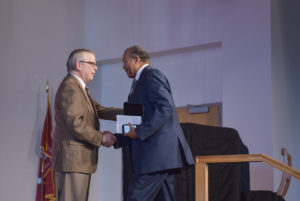
By Jesse Russell, student news writer, Campus Times
CAMPBELLSVILLE, Ky. – “The Campbellsville University Dialogue on Race was launched in the fall of 1999 and was an outgrowth of an ongoing series of discussions we had with a group of Black pastors from around the state, along with community leaders, as a way of increasing racial and ethnic understanding and discussion on the university campus,” Dr. John Chowning, executive assistant to the president for government, community and constituent relations, said.
There was a national movement, at that point in time, in which organizations were encouraging by the White House to have organized conversations on race.
The Dialogue on Race has been ongoing annually at CU since 1999 with no interruption and has involved a number of outstanding speakers as well as community and campus leaders meeting with classes to have intentional discussions on racial issues and concerns, Chowning said.
Chowning said, “Through the years, many students, as well as faculty and staff, have reported very positive results and a better understanding of the issues that have long divided us and ways to bring us together.”
Chowning said one goal of the Dialogue on Race is to encourage CU students, and others involved, to take time to listen to others and to commit to dialogue and conversation rather than engaging in stereotypical and prejudicial thinking about others.
“CU’s campus culture as a whole, is increasingly diverse so it is very important that we take time to listen to each other, to learn about each other, and then to treat each other with Christian love and compassion,” Chowning said.
“And it is important to understand, that although we have made progress as compared to the pre-Civil Rights era, there remains problems of systemic racism that must be addressed in our society – and it takes the involvement of all of us to work toward building a campus and larger community where no one is judged by the ‘color of their skin, but rather by the content of their character’ as Dr. Martin Luther King Jr. shared,” according to Chowning.
As to the future, Chowning believes that those of us who are professing Christians must more strongly acknowledge that in Jesus Christ, we are called to Galatians 3:28 Christians – i.e., where there is “neither Jew nor Gentile…. there is no male and female, for you are all one in Christ Jesus.”
“We must put action to our faith and work to end systemic racism in all areas of life – whether in the work place, in the community, in the church, in the political arena, in civic life, in business and industry.
“We must work and be engaged in this effort, and it is not a ‘one and done deal’ – it is an ongoing and daily effort,” he said.
“If we as Christians are who, and whose, we profess to be, that is believers in and disciples of Jesus Christ, then we will be transformed by the radical love of the Crucified and Risen Lord – and we will be committed to tearing down walls between races and groups and building bridges that bring people together,” Chowning said.
Chowning said, “In a Christian institution and as Christian believers we must set the example. We must be ‘the ears and eyes, the hands and feet of Jesus’ and see people with the compassion of Jesus.”
Chowning said we must become involved with people of other races and ethnicities and take time to listen and learn about the history, traditions and concerns of people of other races and ethnicities.
Those in the historical majority community must be willing to take time to speak out on the issues of racial justice and equity and to do all we can to help bring attention and public policy action to the concerns of those in the Black and other communities Chowning said.
Wanda Washington, diversity and community coordinator, gave her perspective and said as a coordinator of Dialogue on Race, “The success of the program is built on the belief of the worthiness of the program which is evident by the strong participation of the professors always desiring to have a facilitator in their class as well as the engagement of the student’s participation and overall take away.
“Creating a safe and healthy environment for discussion in the classroom that spills over into the campus can only add to stronger and positive relationships elsewhere.”
Campbellsville University is a widely acclaimed Kentucky-based Christian university with more than 13,500 students offering over 100 programs of study including Ph.D., master, baccalaureate, associate, pre-professional and certification programs. The website for complete information is www.campbellsville.edu.
